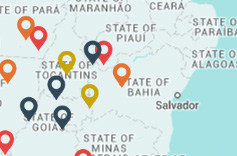Manuel Querino Institute of Afro-Brazilian Studies – IMAQ / Palmarino Circle (São Paulo)
Campaign in defense of the human rights of the black social sector against ethnic cleansing
São Paulo
The group will organize a campaign against “Ethnic cleansing” that will stimulate the consciousness and mobilization of society against the negative impact of racism against afro-descendants. The work will occur in five states where the Palmarino Circle has representatives: Bahia, Espírito Santo, Pará, Rio de Janeiro, São Paulo.
The proposal is to put together a handout and a training session on a subject proposed by five people in each of these states, who will then lead further activities. Research will also be carried out on several topics: removals and evictions; police violence; public health care; and incarceration of the black population. Furthermore, a site will be launched to serve as a collective observatory for reporting human rights violations of the black population and institutional racism in black urban neighborhoods.
Finally, the campaign will begin with a seminar. The research, site and handout will all be released at the event. Discussions will be held to create a proposition with recommendations for the Brazilian government to end “Ethnic Cleansing.”
Context
Palmarino Circle asserts that measures taken by Brazil in the economic, public policy and legal justice spheres corroborated in the marginalization and mortality of blacks in the country, unleashing a phenomenon they call “Ethnic cleansing.”
The institutionalization of practices was derived from a racist mentality, reflected in the extermination of the black population by the direct or indirect action of the authorities; in the incarceration en masse of afro-descendants; and in the policies of removal and eviction.
The direct extermination, as mentioned, comprises state violence; in the generalized suspicion of blacks; in the police action influenced by “racial filters”; in the criminalization of the black individual and the territory where the majority of them live; and in the corporatism of police institutions in judgments on homicides committed by their agents. The consequences are revealed by the police homicide rate, which victimizes black youth three times more than white.
As indirect extermination, the group points to the insensitivity of the authorities to vulnerable sectors of society; the insufficiency of basic sanitation infrastructure in highly socially vulnerable areas; the neglect in treating outbreaks of lethal diseases, such as dengue. Thus there is a degradation of the public hospital system; a proliferation of diseases and an increase in the number of lethal victims in vulnerable populations, majoritarily composed of black people.
Similarly, the policy of incarceration is reflected in a prison population composed, in its majority, of blacks and mixed-race inmates; and the policy of removals and evictions, in function of real estate speculation and the social division that defines the areas where the black and poor population can live and promotes social and geographic segregation with territorial, economic and socio-cultural isolation.
About the proponent
As a national current of the black movement, created in March 2006, the Palmarino Circle has been constructing and participating in concrete actions against racism on several fronts. The group participated in the construction of the Committee Against the Genocide of the Black Population, of which it is a member; in the mobilization leading to the political actions May 13 Struggle and Black Consciousness March; and was on the Conneb — National Black Congress of Brazil.
The politics of the Palmarino Circle are also found in its cultural actions and initiatives at its centers such as the Palmarino Soiree and Cinema Palmarino, in addition to cooperation from the Manuel Querino Institute of Afro-Brazilian Studies.
Funding Line
Annual Call for Proposals
Year
-
Total Granted
-
Duration
-
Main Themes
Confronting racism






